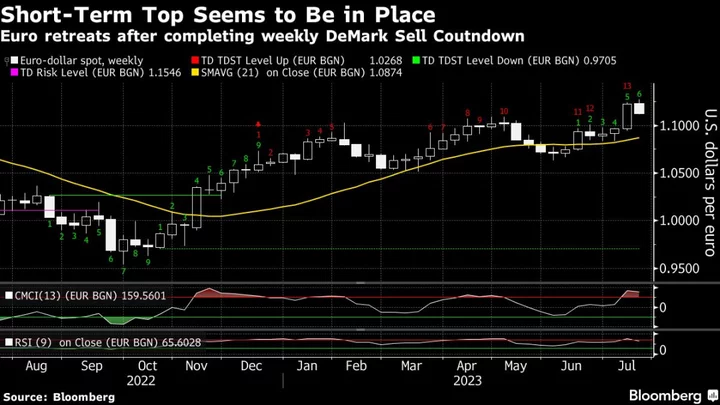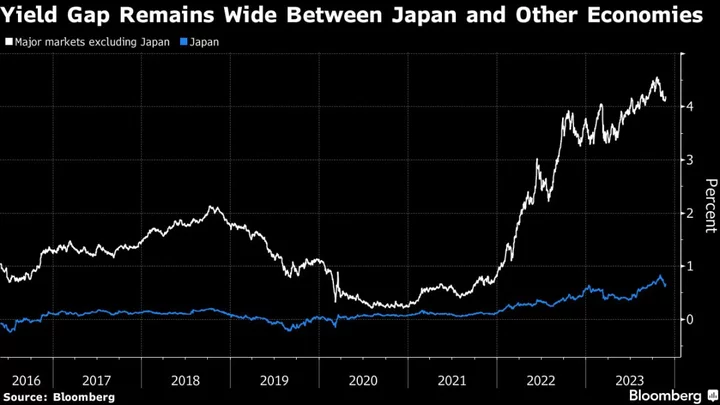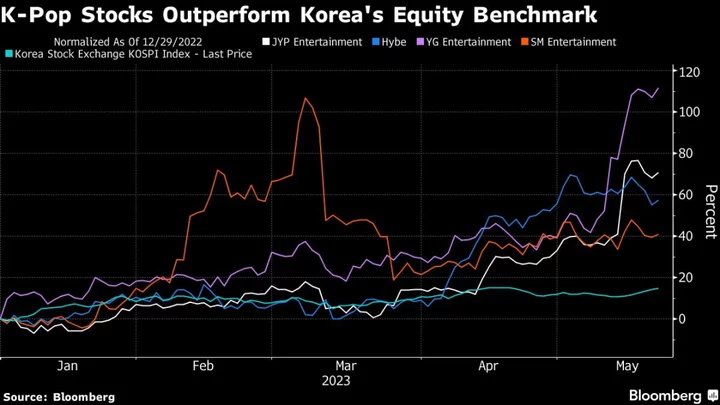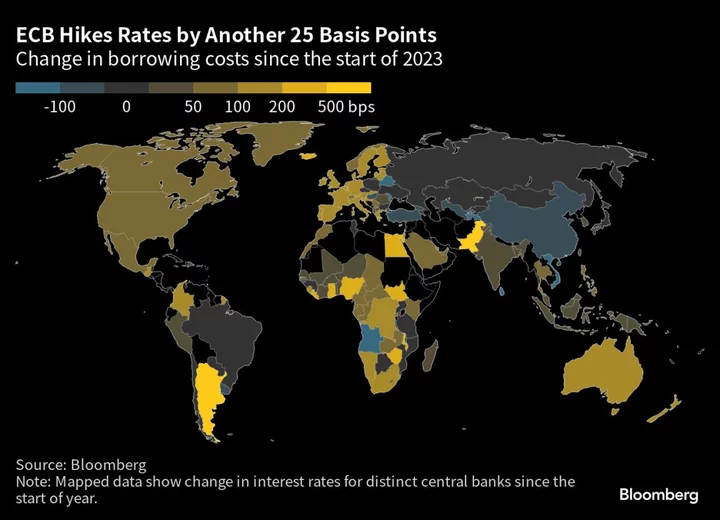By some measures, the euro is at its most expensive level on record, potentially setting itself up for a fall if starts to undermine the euro area economy and forces the European Central Bank to turn dovish.
The common currency’s so-called nominal effective exchange rate, which compares it to the currencies of the euro area’s trade partners, has never been stronger. It’s also near its highest level against the yuan in three years, potentially dimming the appeal of the region’s exports at a time when a slew of data show both the European and Chinese economies are foundering.
The euro’s strength is “absolutely” a concern for the ECB, said Mark Dragten, head of discretionary FX at Insight Investment.
“Europe sells a good deal of product to China,” he said. “You have to wonder about demand when the Chinese economy is slowing.”
Though the ECB looks at a range of currency measures beside the nominal effective rate, the common currency’s gains are starting to look precarious.
The euro trades near a 17-month high versus the dollar, up more than 18% since falling below parity with the greenback in September, as the ECB delivered the most aggressive monetary-tightening cycle in its history. It has also shot up against the yen and recently jumped versus the pound.
Technical signals suggest the currency is overbought. There’s been a bearish reversal of the euro’s nine-week relative strength index, while the Commodity Channel Index — which measures current prices relative to historical levels — has started to fall, pointing to losses ahead.
“The euro-dollar has no business up here, and it knows it,” said Brad Bechtel, a strategist at Jefferies LLC.
Should ECB President Christine Lagarde ease off on her aggressive inflation-fighting rhetoric when officials meet on Thursday, the euro could go the way of the British pound. Sterling’s winning run hit a wall when UK price-growth data came in surprisingly slow last week.
“The euro and the pound are bit ‘over their skis’ relative to reality,” Bechtel said, predicting the euro will fall back to around $1.1080, from about $1.1114 on Friday.
Analysts surveyed by Bloomberg forecast the euro will drop to $1.10 by September before ticking higher to $1.12 by the end of the year.
What Bloomberg Strategists Say...
“On a rate-differential basis, the euro should be trading below $1.10. The advance to levels unseen in 17 months was backed up by options demand, yet little has essentially changed on the macro backdrop. The market’s bias to overreact on the narrative that the Fed tightening cycle is ending was once again evident and a fresh catalyst is needed for the common currency to resume the uptrend.”
— Vassilis Karamanis, FX strategist
Currency strength may feature in the ECB’s messaging this week, according to John Hardy, head of FX strategy at Saxo Bank. The central bank “is likely worried on the currency front and recognizes it as a risk on the growth side of the economy,” he said.
The ECB is widely expected to lift rates by a quarter-point to 3.75% on Thursday and investors will scrutinize Lagarde’s remarks for clues on whether another hike in September is likely.
Recent economic data out of the euro area have missed forecasts, driving down Citi’s Economic Surprise Index, which measures data surprises relative to market expectations. The gauge has been diverging from its US equivalent over the past two months.
A string of economic data due this week will help policymakers shape their next steps, including PMI figures for France, Germany and the euro area on Monday that are mostly forecast to slow. On Tuesday, the widely followed German IFO expectations indexes will come out and on Friday, France releases its second-quarter GDP report, with growth predicted to decelerate on a yearly basis.
“The big test is going to be growth,” said Kit Juckes, chief currency strategist at Societe Generale. “The European economy needs to show a bit more resilience.”
This Week:
- A busy week for events and data is scheduled with the ECB and Federal Reserve both set to raise interest rates by a quarter-point, as investors seek clues on the outlook for further monetary policy tightening. The Bank of Japan will also announce policy The ECB publishes its second-quarter bank lending survey, while PMI and inflation figures will provide the latest update on prospects for economic and price growth
- Lagarde’s post-meeting press conference is the only scheduled speaking engagement
- UK calendar is set to take a breather ahead of next month’s Bank of England policy decision, with June PMI figures the only economic data of note
- Germany, Italy and Belgium are set to sell around €17 billion ($18.9 billion) of bonds next week. The UK DMO will sell £3b of 15-year debt and the BOE will hold a QT sale of medium-maturity notes. Moody’s Investors Service reviews the Netherlands
--With assistance from Alice Gledhill.









